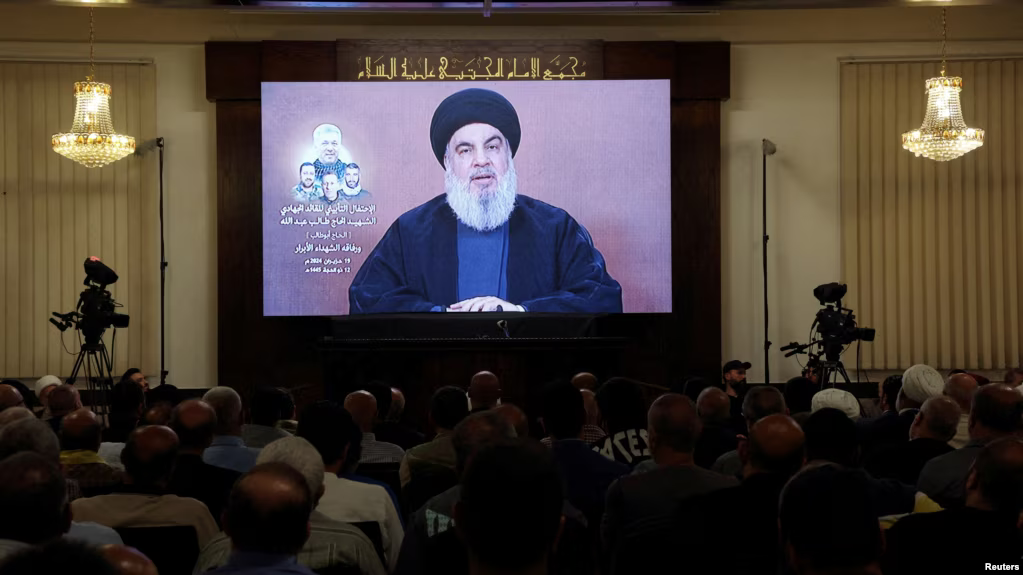
In a recent address, Hezbollah chief Hassan Nasrallah issued a stern warning to Israel, stating that invading northern Israel remains a "standing" possibility should a major conflict be imposed on Lebanon. Nasrallah's remarks come amid rising tensions along the Lebanon-Israel border, with Israeli officials reaffirming their readiness for an all-out war against Hezbollah.
Nasrallah's speech, delivered via video feed, was marked by a strong message of defiance. He asserted that Israel is the party that should be "scared" of an all-out war. “All what the enemy says and the threats and warnings the mediators bring – and what is being said in the Israeli media – about a war in Lebanon does not scare us,” he declared. He further warned that any major Israeli offensive against Lebanon would lead to a war with “no restraint and no rules and no ceilings.”
Israeli Foreign Minister Israel Katz had earlier raised the prospect of a major conflict with Hezbollah after the Lebanese group released surveillance drone footage showcasing significant infrastructure and military sites in northern Israel. “We are very close to the moment of decision to change the rules against Hezbollah and Lebanon. In an all-out war, Hezbollah will be destroyed and Lebanon will be severely hit,” Katz stated in a social media post. He acknowledged that Israel would pay a price on both the front and home fronts but emphasized that the nation would remain strong and united, with the full power of the Israeli military poised to restore security to the northern residents.
![Members of Hezbollah attend the funeral of Taleb Abdallah, a senior field commander of Hezbollah who was killed in an Israel attack, June 12, 2024 [File: Mohamed Azakir/Reuters]](https://www.aljazeera.com/wp-content/uploads/2024/06/2024-06-12T121809Z_1674632330_RC2O98AWUOYI_RTRMADP_3_ISRAEL-PALESTINIANS-LEBANON-HEZBOLLAH-FUNERAL-1718817615.jpg?resize=770%2C513&quality=80)
Nasrallah, however, underscored Hezbollah’s enhanced military capabilities. He revealed that the group has acquired new weapons and possesses a significant number of drones manufactured locally. “The enemy knows well that we have prepared ourselves for the most difficult days,” he said. “The enemy knows well what awaits it, and that’s why it has been deterred so far. And it knows that there will be no place in the [country] that would be spared our rockets and drones. And it won’t be indiscriminate bombing: every rocket – a target.”
He also suggested that Hezbollah might deploy ground forces into Israeli territory, a possibility that has caused considerable fear among the Israeli defense establishment. “There is a lot of fear from the enemy that the resistance would invade northern Israel, and this is a standing possibility that remains present in the context of any war imposed on Lebanon,” Nasrallah stated.
The conflict has broader regional implications. Nasrallah issued a warning to Cyprus, a European Union member located west of the Lebanese and Israeli coasts. He claimed that Israel is conducting military exercises in Cyprus on terrains similar to southern Lebanon and plans to use Cypriot airports and bases for military purposes if its infrastructure is attacked during a major war. “Opening Cypriot airports and bases for the Israeli enemy to target Lebanon means the Cypriot government has become part of the war, and the resistance will deal with it as part of the war,” he warned.
Furthermore, Nasrallah mentioned the possibility of opening a naval front against Israel in the Mediterranean. He reiterated Hezbollah's commitment to its ongoing attacks against Israeli targets and outlined a clear solution to the crisis: ending the Israeli war on Gaza. According to Palestinian health officials, the Israeli assault on Gaza since October has resulted in over 37,000 deaths. The conflict began when Hamas, the Palestinian group governing Gaza, launched an attack on southern Israel on October 7, killing over 1,139 people and capturing approximately 250 others.
Nasrallah defended Hamas's actions and its demands in response to a United States-led proposal for an enduring ceasefire. He criticized the US plan, highlighting an "obvious" gap that would allow Israel to resume the war after the initial stage, which includes the release of some Israeli captives held by Hamas.
As tensions continue to escalate, Nasrallah's declarations signal a volatile and potentially explosive situation at the Lebanon-Israel border, with significant regional implications and the looming threat of an all-out war.

















